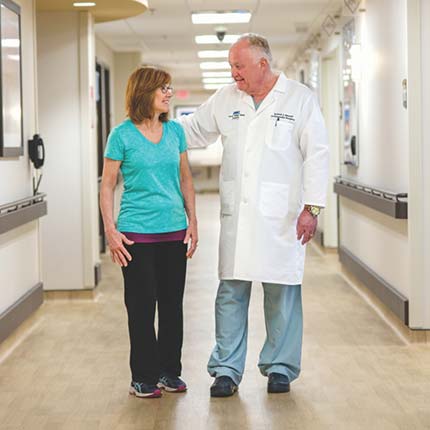Knee Replacement
If your knee is severely damaged by arthritis or injury, it may be hard for you to perform simple activities, such as walking or climbing stairs. You may even begin to feel pain while you are sitting or lying down.
If nonsurgical treatments like medications and using walking supports are no longer helpful, you may want to consider total knee replacement surgery.
Over 1 million total knee and hip replacement surgeries are performed each year in the United States. In the past, physicians typically recommended knee replacement for older patients because they tend to be less active and put less stress on the implant
compared to younger people. But today, the procedure also may be an option for those who are younger and more active due to technologically improved implants that can withstand more stress, endure more strain and last longer.
Advances in surgical technology have improved over time as well, including the emergence of minimally invasive, robotic-arm assisted knee replacements that provide detailed 3D images of each patient’s unique anatomy for optimal implant positioning.
Total Knee Replacement
In knee replacement surgery, the surgeon removes the arthritic ends of the bone, and resurfaces that with a metal implant. Over the past several years, the surgery has become far less invasive than in past years (minimally invasive surgery) as techniques
and equipment have improved. Almost all patients are now considered candidates for this minimally invasive approach. Almost all implant designs consist of two metal components to cover the end of the thigh bone (femur) and the top of the shin bone
(tibia). The metal is usually mainly a composite of chrome and cobalt. A durable piece of plastic (polyethylene) is sized to fit between the metal surfaces as a new cushion and make the knee stable. A plastic button may be used to make the kneecap
more comfortable and fit in the new metal groove. The artificial joint may be secured in place by natural bone growing into the metal, or can be cemented into place if the bone is more fragile.
Joint replacement surgeries are performed at DMC Harper University Hospital, DMC Detroit Receiving Hospital, DMC Sinai-Grace Hospital and DMC Huron Valley-Sinai Hospital.
Robot-Assisted Total Knee Replacement
Orthopedic surgeons at the Detroit Medical Center utilize Mako SmartRobotics™, a robot-assisted surgical option to perform your total knee replacement. Mako uses 3D CT-based planning software so your surgeon can know more about your anatomy to create
a personalized joint replacement surgical plan.
Detroit Medical Center has performed thousands of Mako SmartRobotics™ joint replacement surgeries since 2012.
Potential benefits of Mako SmartRobotics™ compared to traditional joint replacement surgery may include the following:
- Precise resurfacing of the arthritic portion of the knee
- Optimal implant positioning resulting in a more natural feeling knee following surgery
- Less pain
- Quicker recovery time
- Lower risk of complications
- Accurate placement of implants reduces the need for future surgeries on that knee.
When you hear ‘robotic-arm assisted technology,’ it’s important to understand that the Mako robotic-arm doesn’t actually perform the surgery. Surgery is still performed by your orthopedic surgeon, who uses the Mako system software
to pre-plan your surgery, and the robotic arm to help prepare the bones for your new knee extremely precisely.
Partial Knee Replacement
Your orthopedic surgeon may recommend partial knee replacement instead of total knee replacement. This may also be performed with the Mako SmartRobotics™ system. Partial knee replacement is appropriate in certain patients, who also have their knee
arthritis confined to only one side of the knee, or just under the kneecap.
Partial knee replacement has potential advantages in the right patient, which may include the following:
- Less invasive surgery
- Preservation of all healthy bone and ligaments
- Less blood loss
- Reduced pain after surgery
- Shorter recovery time, and reduced hospital stay.
- A more natural feeling knee
Revision Knee Replacement
Unfortunately, some knee replacements may need to be re-done, usually because they have worn out after many years. Other knees might need to be re-done due to other complications. Fortunately, DMC’s orthopedic specialists are experienced in re-doing
knee replacements to restore normal knee movement and relieve pain.
Why Choose DMC for Knee Replacement?
The DMC provides safe and compassionate orthopedic care at 6 hospitals, 13 clinics and 28 outpatient rehab centers throughout metro Detroit. We are also proud to be the medical services provider for the Detroit Red Wings and Detroit Tigers.
Blue Cross Blue Shield has designated DMC Harper University Hospital and DMC Huron Valley-Sinai Hospital as Blue Distinction Centers for knee and hip replacement. Blue Distinction Centers are healthcare facilities and providers
recognized for their expertise in delivering specialty care.
DMC has more than 35 operative and non-operative orthopedic and sports medicine physicians on staff who have performed thousands of joint replacement and orthopedic procedures from the simplest to the most complex. There are also multiple highly trained
joint replacement specialists to tackle the most challenging of first time or revision knee replacements. DMC hospitals have a total of 4 robots that perform, minimally invasive, robot-assisted joint replacement surgeries.
To help treat our patients better, we invest our time in improving our orthopedic knowledge, quality of service and hospital safety. The DMC voluntarily participates in clinical trials and other initiatives that may help improve the success rates of patients.


